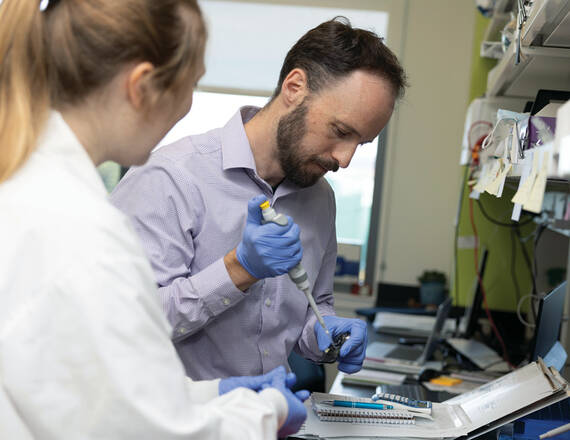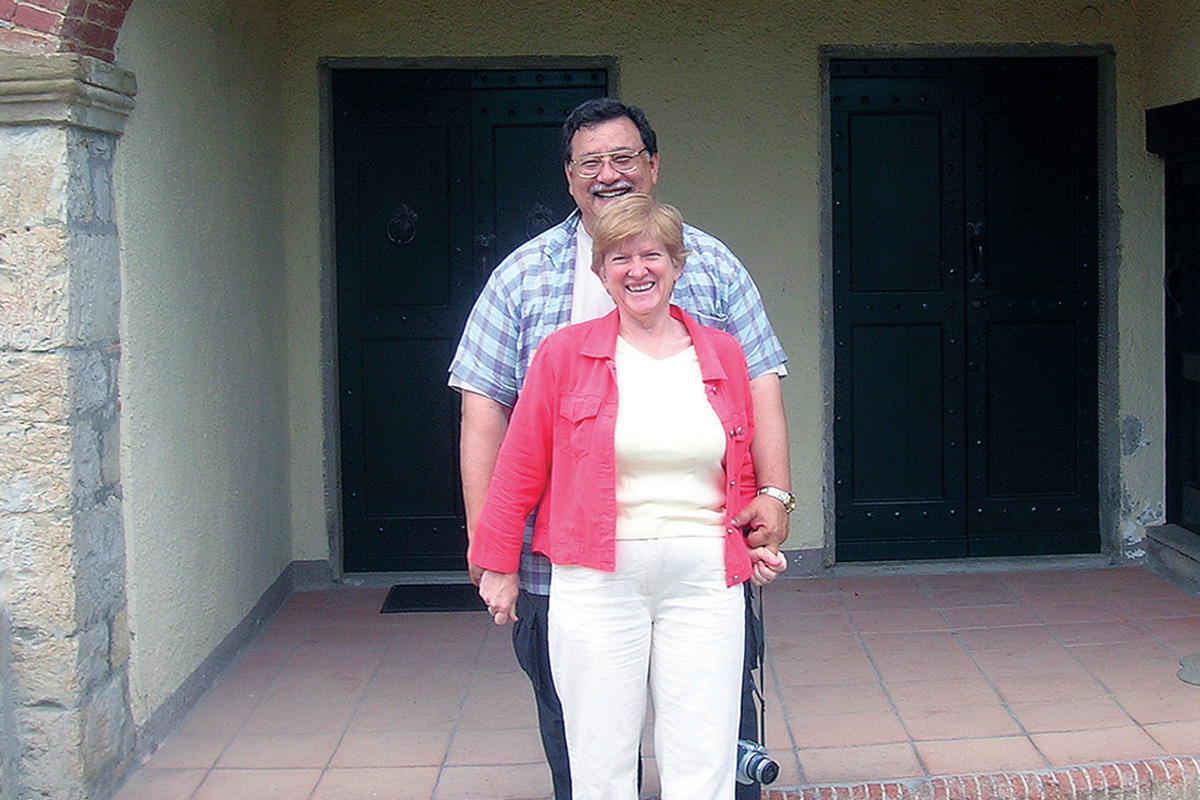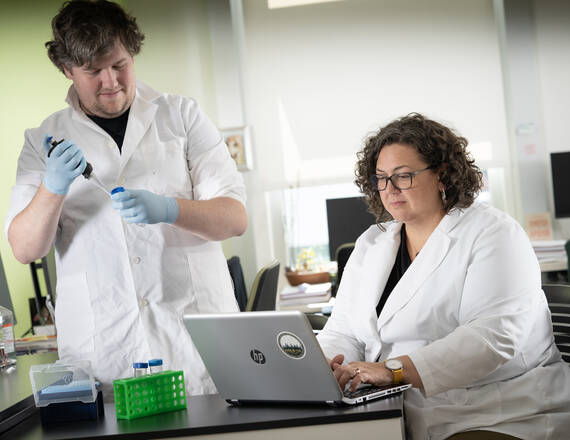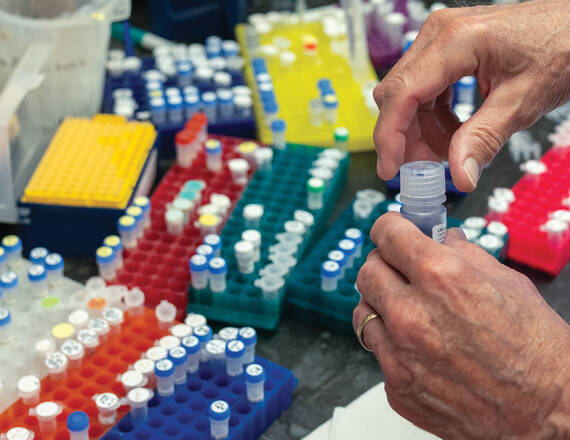Are Some Cancer Cells Predestined to Spread?
Geisel Researchers Aim to Uncover Underlying Cellular Triggers of Metastatic Pancreatic Cancer
As a historian might create a family tree to study the relationships between ancestors and descendants, researchers at the Geisel School of Medicine at Dartmouth are tracking the lineage of pancreatic cancer cells to discover which ones will become metastatic, spreading to other parts of the body and posing the greatest risk to a patient’s life. This genealogical information may one day lead to better, more targeted treatments and improved patient outcomes for this highly deadly disease.

“Many patients with pancreatic cancer die due to metastatic disease. But we don’t have a good understanding as to why the disease spreads. What is different about the cells that leave the pancreas and go elsewhere?” says Aaron McKenna, PhD, assistant professor of molecular and systems biology at Geisel and Dartmouth Cancer Center. “We’re interested in how tumor cells evolve over time. Our lab has technology that follows how that happens.”
Evolution of Cancer Cells
To trace the cellular lineage of cancer, McKenna and his team have turned to CRISPR, the revolutionary technology that enables scientists to selectively target and modify a specific DNA sequence in the cells of living organisms. Since it was first described nearly 15 years ago, CRISPR has led to critical advances across broad swaths of science and medicine—from finding ways to neutralize malaria-causing mosquitos to protecting essential crops such as potatoes and citrus from disease.
McKenna is relying on CRISPR technology to create a genetic “ID tag” that can distinguish between cellular lineages that pose the greatest risk for cancer metastasis and those that do not.
Specifically, McKenna and his team use CRISPR to create breaks in cancer cells’ DNA, which in turn prompt DNA to repair itself. But this repair process is imperfect; those repairs often introduce errors in that cell’s genetic code. As the repaired cell divides and yields a new generation of cells, its daughter cells carry on the introduced “mistakes” in their DNA, too. Over time, these mistakes become the markers that distinguish between different cellular lineages, eventually allowing McKenna to track those genetic ID tags and find out which specific cancer cells will become metastatic.
“With lineage-related technologies [like CRISPR], we’ll be able to ask questions that we couldn’t ask in the past,” McKenna says. “Are there specific groups of cells that will always evolve to become metastatic as dictated by ancestral cells years ago? Or can cells choose to switch into metastatic cells? Or is this random chance? Currently, we don’t understand the answers to those questions because we haven’t had these lineage trees before. We couldn’t trace the cells’ evolution because we haven’t been able to relate different cells to one another.”
Discovering the relationships between parent and daughter cells may reveal the answers to these questions about how cancer metastasizes. McKenna hopes one day scientists can improve cancer treatment by targeting the cause of metastasis: either the subpopulation (the “family”) of cells fated to metastasize, or the switch before they become metastatic, depending on what’s happening within the cells.
“Without knowing how cells are related, we don’t know how to target treatment, so we’re hopeful that we can track the identities of cells and the ‘family tree’ that relates them all,” McKenna explains. “We will be able to ask questions about the cells at the bottom of the tree and all the cells throughout the tree. When it comes to treatment, cell evolution matters.”
Brighter Future for Patients
Pancreatic cancer currently has a very low five-year survival rate of less than 13%—something that Gail Coleman knows all too well. Pancreatic cancer took the life of Coleman’s mother in 1989, her father in 2002, and her husband, Ken Bruntel, D ’71, in 2009. Coleman’s parents each died within weeks of being diagnosed, and her husband died exactly four months after his diagnosis. After Bruntel died, she thought, “I have to do something about this, to honor his memory and my parents.”
In part because of Bruntel’s connection to Dartmouth as an alum, Coleman visited the Dartmouth Cancer Center and learned about McKenna’s research project, “Mapping the evolution of pancreatic cancer treatment resistance.” Coleman decided to fund the project with a $250,000 donor-advised charitable gift she established in Bruntel’s memory. She is eager to be part of the research, learning about the findings and watching its progress.

“I want to understand,” says Coleman, who has given philanthropic gifts to several institutions to support pancreatic cancer research. “I want to fund projects I think are promising, and I’m especially concerned about metastatic disease, which is what Aaron is researching.” She is hopeful McKenna’s research will one day bring better outcomes to people with pancreatic cancer.
“Pancreatic cancer needs targeted analysis because patients have abysmal outcomes,” McKenna says. “That’s why Gail’s gift is so important. Scientists are interested in all types of cancer, but other cancer lab findings can’t necessarily be applied to pancreatic cancer.
“Each cancer is a different disease, so to make headway in patient outcomes, we must target specific cancers individually. Understanding the evolution of cells is the first step toward better treatment interventions.”
The first part of McKenna’s three-year project aims to improve the underlying CRISPR-based technology to ensure that the cell lineages that are revealed are accurate, a goal that has progressed more quickly than anticipated. His lab has already proceeded to the second part of the project: testing that technology in animal models to understand how treatments such as chemotherapy and immunotherapies can target the disease more effectively.
McKenna emphasizes that philanthropy plays an important role in getting research started. “The National Institutes of Health is risk-averse—you need to have done the research already to get NIH funding. Philanthropy allows interesting, early-stage ideas to become impactful.”
To learn more about research at Dartmouth Cancer Center, contact Erin Shreve at 603-646-5878 or Erin.Shreve@dartmouth.edu.

